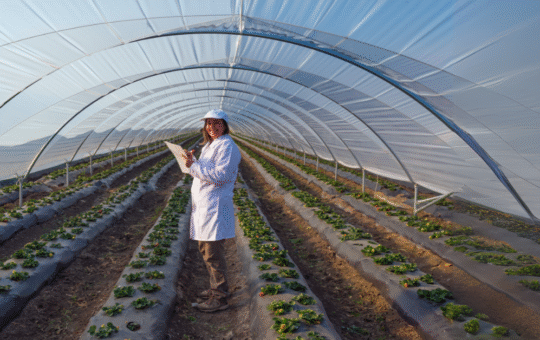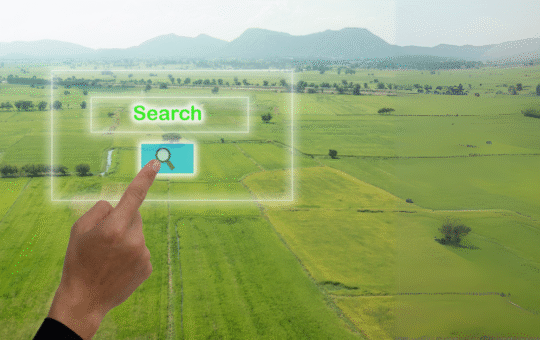
Level 5 Climate Resilience in Agricultural Engineering
- Advanced Knowledge: Gain expert knowledge in designing climate-resilient agricultural systems through engineering approaches.
- Practical Engineering Solutions: Learn how to apply advanced engineering techniques to enhance the resilience of agricultural systems to climate change impacts.
- Technological Integration: Understand the integration of modern technologies, such as renewable energy, water conservation technologies, and automation in agriculture to improve resilience.
- Career Growth: Enhance your career prospects by developing expertise in a growing field focused on sustainable agriculture and climate adaptation.
- Impactful Contribution: Become part of the solution to the global challenge of climate change by improving food security and sustainable agricultural practices.
- Understand Climate Resilience Engineering: Comprehend the principles and practices of climate resilience in the context of agricultural engineering, emphasizing the development of robust agricultural systems.
- Climate-Smart Agricultural Infrastructure: Design and implement climate-smart infrastructure that can withstand and adapt to climate variability and extremes, such as droughts and floods.
- Sustainable Water and Irrigation Systems: Develop and optimize water and irrigation systems that support efficient water use and help mitigate the impact of climate change on water availability for agriculture.
- Climate-Resilient Crop Production Technologies: Utilize engineering solutions for climate-resilient crop production, including the development of drought-tolerant irrigation systems, climate-controlled greenhouses, and protected agriculture.
- Renewable Energy Solutions in Agriculture: Explore the application of renewable energy sources (e.g., solar, wind, biogas) in agriculture for sustainable energy management.
- Sustainable Land Use and Resource Management: Implement land management techniques that help conserve soil, reduce water consumption, and improve overall land productivity in the face of climate change.
- Assessment and Risk Mitigation: Conduct climate risk assessments for agricultural systems and develop engineering solutions to mitigate potential risks from extreme weather events and climate shifts.
- Policy and Advocacy: Understand the role of policy and government support in fostering climate resilience through technological advancements in agricultural engineering.
- Introduction to Climate Change and Agricultural Engineering
- Overview of climate change science and its impacts on agriculture.
- Key principles of agricultural engineering.
- The role of engineering in building climate-resilient agricultural systems.
- Climate-Resilient Infrastructure and Engineering Solutions
- Design of climate-resistant infrastructure for agriculture (irrigation, drainage, greenhouses).
- Climate-smart buildings and structures for crop storage and processing.
- Use of automation and smart technologies in agriculture for resilience.
- Water Management and Irrigation Engineering
- Efficient water management strategies for climate-resilient agriculture.
- Design and optimization of irrigation systems (e.g., drip irrigation, rainwater harvesting).
- Technologies for improving water-use efficiency in crop production.
- Renewable Energy in Agriculture
- Application of renewable energy systems (solar, wind, biogas) in agriculture.
- Engineering solutions for energy-efficient farming operations.
- Role of renewable energy in mitigating the environmental impact of agriculture.
- Agricultural Machinery and Equipment for Climate Resilience
- Engineering of machinery and equipment to cope with climate change impacts.
- Design and application of climate-resilient agricultural machines for planting, harvesting, and post-harvest handling.
- Technological innovations in farm machinery for sustainable agriculture.
- Sustainable Soil and Land Management
- Techniques for soil conservation and sustainable land use.
- Impact of climate change on soil health and strategies to mitigate it.
- Integrated land management for increasing agricultural productivity while reducing environmental impact.
- Climate Risk Assessment and Management
- Techniques for assessing the vulnerability of agricultural systems to climate change.
- Development of mitigation strategies and adaptation plans for vulnerable agricultural systems.
- Tools and models for climate risk forecasting in agriculture.
- Policy, Governance, and Global Perspectives on Climate Resilience
- Role of policy and regulation in fostering climate resilience in agriculture.
- Analysis of global and regional policies for climate change adaptation in agriculture.
- Opportunities for innovation in climate resilience through public-private partnerships.
- Climate Resilience Engineer
- Agricultural Engineer
- Sustainable Agriculture Consultant
- Water Resource Manager
- Renewable Energy Specialist for Agriculture
- Agricultural Infrastructure Designer
- Environmental Engineer
- Climate Policy Advisor
- Agricultural Project Manager
- Expert Faculty: Learn from experienced professionals with practical expertise in agricultural engineering and climate resilience.
- Practical Learning: Engage in real-world applications, case studies, and fieldwork that demonstrate the practical side of climate-resilient agricultural engineering.
- Industry-Relevant Curriculum: Stay ahead of the curve with a curriculum that reflects the latest trends and advancements in agricultural engineering and climate adaptation.
- Global Impact: Be part of the global effort to combat climate change and improve food security by developing innovative, engineering-based solutions.
- Flexible Study Options: Study at your own pace, with options for online and in-person learning tailored to your schedule and location.
Study Units
- Introduction to Climate Change and Agricultural Engineering
- Overview of climate change science and its impacts on agriculture.
- Key principles of agricultural engineering.
- The role of engineering in building climate-resilient agricultural systems.
- Climate-Resilient Infrastructure and Engineering Solutions
- Design of climate-resistant infrastructure for agriculture (irrigation, drainage, greenhouses).
- Climate-smart buildings and structures for crop storage and processing.
- Use of automation and smart technologies in agriculture for resilience.
- Water Management and Irrigation Engineering
- Efficient water management strategies for climate-resilient agriculture.
- Design and optimization of irrigation systems (e.g., drip irrigation, rainwater harvesting).
- Technologies for improving water-use efficiency in crop production.
- Renewable Energy in Agriculture
- Application of renewable energy systems (solar, wind, biogas) in agriculture.
- Engineering solutions for energy-efficient farming operations.
- Role of renewable energy in mitigating the environmental impact of agriculture.
- Agricultural Machinery and Equipment for Climate Resilience
- Engineering of machinery and equipment to cope with climate change impacts.
- Design and application of climate-resilient agricultural machines for planting, harvesting, and post-harvest handling.
- Technological innovations in farm machinery for sustainable agriculture.
- Sustainable Soil and Land Management
- Techniques for soil conservation and sustainable land use.
- Impact of climate change on soil health and strategies to mitigate it.
- Integrated land management for increasing agricultural productivity while reducing environmental impact.
- Climate Risk Assessment and Management
- Techniques for assessing the vulnerability of agricultural systems to climate change.
- Development of mitigation strategies and adaptation plans for vulnerable agricultural systems.
- Tools and models for climate risk forecasting in agriculture.
- Policy, Governance, and Global Perspectives on Climate Resilience
- Role of policy and regulation in fostering climate resilience in agriculture.
- Analysis of global and regional policies for climate change adaptation in agriculture.
- Opportunities for innovation in climate resilience through public-private partnerships.
Upon completion of the diploma, learners will be able to:
- Understand Climate Resilience Engineering: Comprehend the principles and practices of climate resilience in the context of agricultural engineering, emphasizing the development of robust agricultural systems.
- Climate-Smart Agricultural Infrastructure: Design and implement climate-smart infrastructure that can withstand and adapt to climate variability and extremes, such as droughts and floods.
- Sustainable Water and Irrigation Systems: Develop and optimize water and irrigation systems that support efficient water use and help mitigate the impact of climate change on water availability for agriculture.
- Climate-Resilient Crop Production Technologies: Utilize engineering solutions for climate-resilient crop production, including the development of drought-tolerant irrigation systems, climate-controlled greenhouses, and protected agriculture.
- Renewable Energy Solutions in Agriculture: Explore the application of renewable energy sources (e.g., solar, wind, biogas) in agriculture for sustainable energy management.
- Sustainable Land Use and Resource Management: Implement land management techniques that help conserve soil, reduce water consumption, and improve overall land productivity in the face of climate change.
- Assessment and Risk Mitigation: Conduct climate risk assessments for agricultural systems and develop engineering solutions to mitigate potential risks from extreme weather events and climate shifts.
- Policy and Advocacy: Understand the role of policy and government support in fostering climate resilience through technological advancements in agricultural engineering.
The Level 5 Diploma in Climate Resilience in Agricultural Engineering is designed for professionals and aspiring engineers who are eager to enhance agricultural systems’ resilience to climate change. This course is ideal for:
Agricultural Engineers and Technologists
Professionals in agricultural engineering seeking to specialize in climate resilience, sustainability, and the adaptation of agricultural systems to future climate challenges.
Sustainability and Environmental Engineers
Engineers focused on sustainable land use, water management, and renewable energy solutions, who want to apply their expertise to the agricultural sector and address climate-related issues.
Water Resource and Irrigation Engineers
Individuals working in water management who wish to deepen their understanding of how to design and optimize water systems that support agricultural productivity while mitigating the impact of climate change.
Renewable Energy Experts
Professionals with a background in renewable energy technologies who are looking to apply their knowledge to sustainable energy solutions in agriculture.
Climate Change Policy Makers and Advisors
Policy professionals who wish to gain insights into the role of engineering and technology in promoting climate resilience in agriculture and contribute to policy development for climate adaptation strategies.
Agricultural Consultants and Advisors
Consultants in agriculture who want to incorporate climate-resilient practices into their recommendations for farmers, agribusinesses, and agricultural enterprises.
Environmental and Climate Risk Managers
Individuals responsible for assessing and mitigating climate risks in agriculture, including vulnerability assessments and the development of adaptation strategies.
Researchers and Innovators in Climate Resilient Agriculture
Researchers or professionals working on the development of innovative solutions for climate-smart agriculture and the integration of climate adaptation technologies in farming systems.
Future Leaders in Climate Resilient Agriculture
Professionals aiming to take on leadership roles in climate-resilient agricultural systems, whether in governmental, non-governmental, or private sector organizations.
Our assessment process is designed to ensure every learner achieves the required level of knowledge, skills, and understanding outlined in each course unit.
Purpose of Assessment
Assessment helps measure how well a learner has met the learning outcomes. It ensures consistency, quality, and fairness across all learners.
What Learners Need to Do
Learners must provide clear evidence that shows they have met all the learning outcomes and assessment criteria for each unit. This evidence can take different forms depending on the course and type of learning.
Types of Acceptable Evidence
Assignments, reports, or projects
Worksheets or written tasks
Portfolios of practical work
Answers to oral or written questions
Test or exam papers
Understanding the Structure
Learning outcomes explain what learners should know, understand, or be able to do.
Assessment criteria set the standard learners must meet to achieve each learning outcome.
Assessment Guidelines
All assessment must be authentic, current, and relevant to the unit.
Evidence must match each assessment criterion clearly.
Plagiarism or copied work is not accepted.
All learners must complete assessments within the given timelines.
Where applicable, assessments may be reviewed or verified by internal or external quality assurers.
Full learning outcomes and assessment criteria for each qualification are available from page 8 of the course handbook.
Top Courses
No results found.
Related Courses
Let's Get in touch
Deleting Course Review
Course Access
This course is password protected. To access it please enter your password below:



